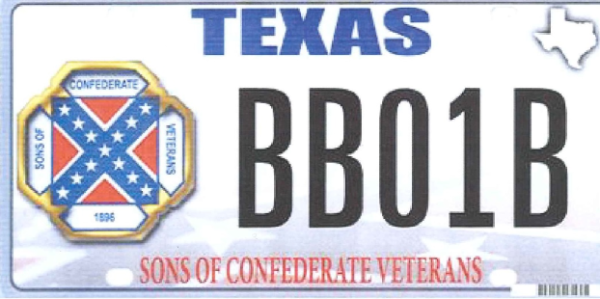Yesterday I discussed the background to Walker v. Texas Division, Sons of Confederate Veterans. Stated briefly, Texas denied Texas SCV‘s application for a specialty license plate with a Confederate flag on it, because the design might be “offensive”. The question is whether Texas is required by the First Amendment to grant the application.
Today I discuss how specialty plate programs have fared in lower courts, and the arguments Texas and Texas SCV bring to the case.
In the courts
Almost every circuit court has required that specialty plate programs be viewpoint-neutral, not restricting designs because of their views. (And the one exception judged a program without an open invitation for designs.) So it’s unsurprising that Texas SCV won its Fifth Circuit case.
Texas appealed to the Supreme Court, which agreed to answer two questions. Are specialty plate programs “government speech” that need not be viewpoint-neutral, such that the design can be rejected as “offensive” (or, indeed, for almost any reason)? And did Texas discriminate by viewpoint in rejecting Texas SCV’s design?
Texas’s argument
Texas says license plates are entirely the government speaking, and it can say or not say whatever it wants. Texas relies on two cases: Pleasant Grove City v. Summum, in which a city’s approval of a limited set of monuments in its city park (and denial of a particular monument) was deemed government speech; and Johanns v. Livestock Marketing Association, in which a government beef-promotion plan that exacted a fee from beef producers to support speech (including the Beef. It’s What’s For Dinner tagline) was deemed government speech that program participants couldn’t challenge on the grounds that it compelled them to speak.
According to Texas, its specialty plates are government speech because Texas “effectively control[s]” the whole program. What matters is whether Texas “exercises final approval authority over every word used” — and it does. Texas allows private citizens to participate, but it has “final approval authority” over every design. Texas also argues that it can’t be compelled to speak by displaying the Confederate flag. By making a license plate, the state’s authority backs (or doesn’t back) every design approved or rejected. Plate purchasers shouldn’t be able to force Texas to espouse the views of an unwanted specialty plate, which drivers would then ascribe to Texas.
And of course, Texas says ruling against them would lead to “untenable consequences”. For every “Stop Child Abuse” plate there’d have to be an opposing plate supporting child abuse, and so on for the whole parade of horribles. Texas particularly notes that the Eighth Circuit forced Missouri to let the Ku Klux Klan join the state’s Adopt-a-Highway program under this logic. (The person behind me in the oral argument line related that one of the highways entering Arkansas was adopted by the KKK under that rule, giving Arkansas visitors that delightful first impression of the state.)
Texas also asserted that assessing how members of the public view a specialty plate is “an objective inquiry”, so that deciding a specialty plate “might be offensive” doesn’t discriminate on the basis of the specialty plate’s viewpoint. As to the Fifth Circuit’s criticism of the “unbridled discretion” provided by the “might be offensive” bar, Texas instead describes it as “discriminating among levels of offensiveness”, such latitude permitted because the state is “assisting speech”.
Texas SCV’s argument
Texas SCV says Texas is being hypocritical. The Capitol gift shop sells Confederate flags. Texas recognizes a state Confederate Heroes Day. It maintains monuments to Confederate soldiers. Either Texas doesn’t really think the Confederate flag is offensive to the public, or its other “government speech” is flatly inconsistent with its specialty-plate stance.
Texas SCV also distinguishes the plates designed by the state legislature from plates designed by private entities. The former are the product of the government, but the only government involvement in the latter is in approval or disapproval. The driver has ultimate control, because only when he designs a plate and ultimately drives a vehicle with it does speech occur. And under Wooley v. Maynard — a case where a Jehovah’s Witness protested New Hampshire’s fining of people who covered up “Live Free or Die” on their license plates, and the Court said New Hampshire couldn’t force a person to espouse the state motto — it’s the individual’s speech (at least for non-legislatively-designed plates).
Texas SCV brushes off Summum and Johanns. Permanent monuments in parks have always been associated with the government, because parks physically can’t accommodate all monuments. Not so for license plates. (And Texas’s $8000 deposit covers startup costs that might justify treating rare plates differently.) And while the beef-promotion messages were part of a “coordinated program” by government to “advance the image and desirability of beef and beef products”, privately-designed specialty plates are not — especially as their fully–contradictory messages are “consistent” only as a fundraiser.
Finally, given that privately-designed specialty plates are private speech, the First Amendment requires that restrictions be viewpoint-neutral. By restricting Texas SCV’s message based on its potential for offensiveness, Texas endorsed viewpoints that deem the Confederate flag racist and discriminated against viewpoints that do not.
Tomorrow, analysis of Texas’s government speech and compelled speech arguments.

